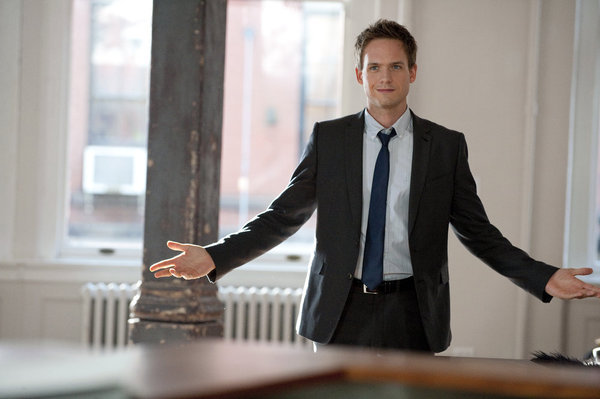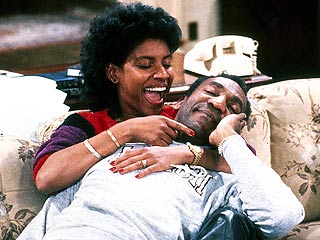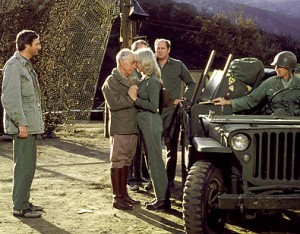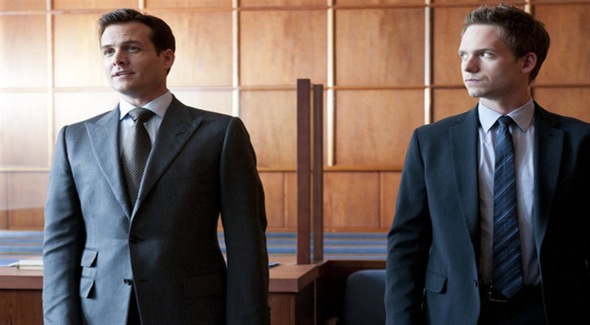I’ve been catching up on Seasons 1 and 2 of Suits, USA’s slick new legal drama. It plays like a quippier, faster, and more shallow version of Mad Men. It’s just clever enough for my taste, but it doesn’t wallow in its cleverness the way geekier shows do – one of my pet peeves. All that said, however, there are two things I struggle with.
(1) The catchy yet incomprehensible theme song. I’ve resorted to making up my own lyrics rather than guessing at what’s really being sung. “Gonna have a pizza pie / in your eye / Gonna split an onion bomb / with your mom …”
(2) The perilously unsustainable premise.
For those who haven’t indulged yet: Harvey Spector (played by Gabriel Macht, having emerged from the doghouse that the title role in Frank Miller’s The Spirit earned him) is a hotshot closer at the prestigious NYC law firm of Pearson Hardman. He’s been told to select a protege out of a pool of interviewing associates, but none of them impress him – except one kid, a scruffy blond with an encyclopedic knowledge of basic law and the photographic memory to prove it. It turns out that this kid, Mike Ross (Patrick Adams), isn’t actually a lawyer. In fact, not only has he never been to law school, he only stumbled into this interview as a way to hide from a drug deal gone bad. Intrigued by Mike’s quick wits and prodigious memory, Harvey hires him anyway.
Neat, right? It tells us something about Harvey right off – he’s a game-player, he values genius and improvisation more than experience, he’s willing to bend the rules to get the job done. It also binds Mike to him in an interesting way – Mike could get in trouble if caught, sure, but Harvey’s career will also be over. So you’ve got two loose cannons on the 50th floor, bending the law in order to serve it.
The only question: how long can they keep this up?
Practicing law without being admitted to the bar, for those who don’t have Mike Ross’s photographic memory, is uniformly illegal. The penalties vary from jurisdiction to jurisdiction, but in New York it’s a misdemeanor. But even without the legal threat, there’s the damage to the reputation of Pearson Hardman. Every time Mike fraudulently represents himself as a lawyer adds another scar to the Dorian Gray-like portrait that must, inevitably, be unveiled. He’s already appeared in court at least twice – most recently in “Break Point” (S2E5), representing a tennis phenom.
Not only has Mike not been admitted to the bar, he hasn’t even been to Harvard – and Pearson Hardman makes a point of only hiring Harvard graduates. So that’s at least two lies that Mike has to keep straight. Mike doesn’t even bother covering his tracks until “Dirty Little Secrets” (S1E4), and that’s with the unsolicited help of a computer hacker. And even when his record is (fraudulently) updated to create a Harvard law degree, he still has an awfully empty past – no college diploma, no prior legal work experience. If any other lawyer invested the amount of effort in checking out Mike’s past that Mike and Harvey invest in checking out their clients and opponents, Mike’s secret would be outed in a heartbeat.
So someone must eventually discover Mike’s secret. And someone, in fact, does – Jessica Pearson (Gina Torres), managing partner of the firm (S2E1). The only reason she doesn’t can him and Harvey immediately is because a bigger threat rears its head. But how much damage could such a discovery do in the hands of Harvey’s intra-firm rival Louis Litt (Rick Hoffman)? Or the Boston lawyer who’s gunning for Harvey, Travis Tanner?

How long can this go on?
On a certain scale, all episode television suffers from this problem. Friends started out as a sitcom about six struggling twenty-somethings (“your job’s a joke, you’re broke / your love life’s D.O.A. …”) but ended up a sitcom about three successful married couples. The Simpsons has sentenced Bart and Lisa to third and fourth grade, respectively, for nearly twenty-five years. And one of these days Ted Mosby has to meet his future wife.
Why is this an issue? Well, because prime time episodic television has to return to an accessible narrative, so that it can always pick up new audience members and sustain revenue. This means that, while characters can grow, they can’t grow in ways that shake up the popular dynamic too much. Some of this may be cowardice by producers; some of it may be the fine-tuned science of showrunning. Either way, it limits the cycles which a popular TV show can make.
These limited orbits make television narratives victims of their own success. If audiences tune into a show because of its original premise – an untested hypothesis, but plausible – then the show becomes popular. As the show becomes popular, the network orders more episodes. As the network orders more episodes, either the show strays further from its premise or the premise becomes less plausible.
Of course, not all shows are equally implausible. Thomas Magnum gets to stay on Robin Masters’ estate for free for an awfully long time in Magnum P.I., but an eight-year freeloader strains the bounds of good taste more than credibility. We have a slightly harder time with Crockett and Tubbs’ run on Miami Vice, able to maintain a low profile as undercover cops despite wearing five hundred dollar suits and driving Ferrarri Testarossas. And some shows can run for years in a steady, unchallenging loop without perturbing our notions of credibility (All in the Family; Seinfeld, etc).
So not all episodic television has to grapple with the issue of plausibility, or at least not as intensely. But some have it worse than others.
In coming to terms with the unsustainability of Suits, I started thinking about shows that also had unsustainable premises, or which started off plausible but grew more ridiculous as time went on. It gave me some useful context, it took me on a little tour of primetime television, and it convinced me that Suits was not the most ridiculous show ever to air. Join me, please, in consulting the Mike Ross Scale of Primetime Implausibility.
Like the Mohs scale, the Mike Ross Scale of Primetime Implausibility (or Ross scale) ranks from 1 to 10, with 1 being the most sustainable premise and 10 the least sustainable. Each point on the scale has a sample show for context and a brief explanation.
1. The Cosby Show: A show that not only acknowledged the growing age of its stars, but was built around it. As each Cosby kid advanced through elementary school, high school, and college, they passed into the wings of history, only to return through syndication or spin-offs.

2. Arrested Development: You don’t typically associate the Bluth Family with the word “plausible,” and the three season run doesn’t say much of the show’s sustainability. But the show always stayed true to its premise, however ridiculous it became. While the Bluths’ adventures were absurd, they were at least consistent in their absurdity: the ridiculousness of one season became canon for the next.
3. Friends: Despite being cited earlier as a show that drifted pretty far from its roots by the tenth season, NBC’s grand sitcom always remained within shooting distance of its original premise, no matter who impregnated whom or started dating whom else.
4. Law and Order: Though each episode was cemented in gritty, torn-from-the-headlines detail, the show when viewed as a narrative arc starts to fall apart. How many days of investigation were supposed to be contained in those 456 episodes? And how did Jack McCoy never get elected Attorney General with his amazing conviction record?
5. Lost: At the exact midpoint of the scale sits Lost, a show that intrigues and frustrates its fans in equal measure. It started off with a bang: an ensemble cast, stranded on a desert island. It kept the audience compelled with enigma after enigma. Of course, the time eventually came for some of the cast to escape their island prison. What happened next? They had to go back, of course.

6. How I Met Your Mother: It’s a fun show, the characters are great, and the dialogue pops. But it’s clear to everyone watching that the writers no longer care about the premise embedded in the title. Think of how tiresome the show would be if every episode had to contribute a brick to some grand arch, checking back in on the title like a nurse doing the rounds.
7. Suits: Yes, ironically, the show which gives the Ross scale its name is not the most unsustainable show on the scale. That’s science for you.
8. That 70s Show: We could forgive this show its chronological excesses because of the youthfulness of its characters, the joy we take in their adventures, and the fact that a lot of what we consider “the Seventies” stretched into the early 80s anyway. But c’mon! It’s in the title!
9. The Simpsons: Twenty-four years in which Bart and Lisa stay in the same grade, Homer works at the same job – or doesn’t, depending on what gig the writers want to give him this week – and Mr. Burns clings stubbornly to life. Only the talent of the voice actors and the pliability of the animation make this show possible at all.
And the highest point on the Ross scale, the primetime show with the least sustainable premise:
10. M.A.S.H.: As groundbreaking and inspiring as it was, a show which ran 11 years, depicting a field hospital in a war that lasted 4 years, which was secretly a commentary on a war that the U.S. was in for 9 years, strains our definition of “sustainable premise” to the breaking point. At some point, Hawkeye, the war’s just gotta end.

What does establishing the Ross scale teach us? Well, with The Simpsons and M.A.S.H. at the high ends, and The Cosby Show and Arrested Development at the low ends, it’s proof that there’s no correlation between the unsustainability of a show’s premise and its quality. Audiences will put up with any hook, no matter how ridiculous, if the writing stays entertaining and if there’s nothing better on.
So can Suits keep its premise going for a third, fourth, fifth, or even tenth season? Maybe. Why not? It hasn’t hurt The Simpsons any.
Perhaps it can also be a lesson to showrunners – and the network execs who greenlight their shows – to focus less on the catchy premise and more on a show’s writing quality. How much does the initial hook of How I Met Your Mother matter seven years later? How much would the producers of Cougar Town like to take another stab at the title? And does the premise of Community tell you anything about the qualities that make it original?
Of course, our attempts to improve the quality of, and discourse surrounding, primetime television have been going on for years, to little effect. Our best efforts here at OTI always hinge on creating the tools and letting later generations put them to use. So have at it, Overthinkers. Where do your favorite shows fall on the Ross scale, and what does that say about them?

Warren Ellis did not create, and has never written, The Spirit. You’re thinking of either Will Eisner (who created the character) or Frank Miller (who made the dreadful film).
Good points otherwise, though…
Thank you, that mistake made my skin crawl.
(though in Planetary, I think one of Doc Brass’s cohorts is a Spirit analogue)
Ugh! Mortifying!
Fixed, and thank you.
I could be wrong but didn’t Harvey send Mike off to take the Bar exam fairly early on in Season 1?
If I remember correctly, Mike has passed the Bar in the past to win a bet. That’s what he tells Harvey during their interview.
The “bar exam” as a bet just adds to the unsustainabilty of the premise. Given his encyclopedic memory, I have no doubt he could pass it (although god, least fun bet ever); however, there is a complicated multi-step process to apply for the bar exam. For example, NY requires applicants to be certified by their law school that they are eligible to sit for the exam, which includes a notarized handwriting signature that the law school sends to the bar examiners. After the bar examiners receive it, the school then has to confirm that the information received is correct. That’s just one step in the exam process, the
Also the problem with this premise isn’t simply that practicing law without a license is illegal, but it’s going to result in massive liability for the law firm. The NY Code of Professional Responsibilty for lawyers makes law firms specifically responsible for the failure of individual partners to supervise associates. The firm would have to pay massive penalties and could actually have its ability to practice as a firm taken away.
Further EVERY single client whom Mike has EVER worked on any matter would be able to sue the firm. It is a form of fraud to charge clients for a “lawyer” when what they are getting is a non-lawyer. While Mike has a clearance rate even higher than Jack McCoy’s – even clients with successful legal outcomes would be able to recover all legal fees/expenses paid and damages.
Also, this is no longer a problem because the firm (through Jessica) has actual knowledge Mike isn’t a lawyer, but Mike would also be guilty of larceny for stealing his lawyer salary for his entire career at PH.
This is so profoundly absurb that as much as I like the show, I see no way for them to ever resolve this in a plausible way. As a final note, there is a public database of lawyers in good standing in New York…
Prison Break had the least sustainable premise of any show. They escaped after the first season! They spent the second season on the run, had to break out from a different prison in the third season, and I didn’t watch the fourth season.
Who are you??? There can only be one.
You have no #6.
“Suits and the Unsustainable Premise” has, in itself, the unsustainable premise of ranking unsustainable premises.
This is the best possible response to that error.
Updated the list! There are now a full 10. I forgot my #8, which is what threw the total off.
I am not a number! I am a free premise!
It always makes me smile to see sitcoms like TBBT trying to regain their sustainability by forcefully going back to status quo (Leonard and Penny breaking up etc.)
Similar in unsustainability to M.A.S.H. at number 10, and for similar reasons, would be ‘Star Wars: The Clone Wars’. It’s been discussed extensively on this site (including Tim’s excellent post from just last week), so I don’t need to go into detail. Basically, it’s already on season 5 of a conflict that only took 2-3 years, was entirely contrived to begin with, and which future events render meaningless. It would be like if they changed the title of ‘How I Met Your Mother’ to ‘How I Met the Woman I Dated Briefly Before I Eventually Met Your Mother’.
Another aggravating factor (legal term!) of Suits’s unsustainable premise is that it is also a totally needless premise. Harvey could hire Mike as his own personal paralegal, pay him whatever he likes, and use his advice to the same degree he currently does. So long as Mike doesn’t hold himself out as a lawyer, represent someone in court, or send out legally significant documents over his signature, there shouldn’t be a problem. Mike could do more or less all the same stuff he currently does scott free, so long as Harvey oversaw and ratified it. For instance, many judicial clerks do this very thing (since clerkships often begin before bar results are announced and, thus, before the clerk is a licensed attorney). For a legal whiz kid, Mike seems not to have spent a lot of time read the Model Rules of Professional Conduct. Though it would be an interesting twist if Mike and Harvey wised up to the fact that they were covering up something that didn’t need covering up, and then began a cover up campaign to cover up the original cover up.
Burn Notice has got to be a 9.5. I quit watching the show last season(season before last?)after he was ‘?unburned?’, but from what I hear he has been burned again? Forgetting that he had forced employment through several other companies(Management and spin-off psychos)from which he left their service in a burn-like manner.
There are two problems I have with the show:
1) As RPMcSweeney pointed out: the premise is not really worthwhile. It doesn’t add anything to the show except an occasional “scare” in which we, in general, know isn’t going to come out. If you remove the “doesn’t have a law degree” angle and replace with “slacked off and did drug deals for after graduation” it adds pretty much the same stuff.
2) Jessica Pearson is not, in any way, a good boss or a good managing partner. I can’t, for the life of me, figure out why anybody would feel any allegiance to her. She tried to destroy the career of roommate in law school, she refused to promote Louis even though we’ve seen nothing but evidence that he’s one of the best lawyers in the firm, constantly undermines her own people, and does not appear to have any leadership qualities. The most unbelievable part of the show for me is that anyone stays at Pearson Hardman.
I would argue that this way, the series would IMO loose a part of it’s dynamic, unless there would be another (maybe more plausible) thing that Mike could be hiding instead.
How would, for example, episodes like “Dirty Little Secrets” work without the aforementioned “secret”?
He could just as easily be hiding a prior drug-dealing felony conviction or any number of things that could equally disqualify him from working at a prestigious law firm.
I actually think Seinfeld ranks mid-to-low on the Ross scale–it gets pretty absurd, but recently I’ve been watching it chronologically for the first time ever, and a lot of things that happen stay happened (ie they make references to past events in previous episodes, etc.). It’s just that the things that happened ultimately don’t matter much, and the characters don’t learn anything, which is in itself part of the show’s main premise.
Ooh, this is a good observation.
How about the West Wing? The vast majority of senior staff and their assistants stick around for years without burn-out or promotion, and then C.J. Cregg (who near the beginning of the series didn’t know why the U.S. had a census) is completely implausibly made the Chief of Staff upon the resignation of Leo McGerry.
Yeah, but they didn’t expect him to die. He wasn’t being written out on purpose so they had to scramble to come up with a replacement. Should they have cast another actor? Possibly. Would the prez? Don’t know. Does anyone know what happens when your Chief of Staff suddenly dies on you? It’s not an average position.
Leo McGarry was on the show for a year after he was fired from the White House – he was the Democratic Vice Presidential candidate when John Spencer died. The Sorkin seasons IMHO were setting up either Toby or Josh to take over as Chief of Staff – when John Wells took over, I think 1) the fact that Allison Janney is an amazing actress and 2) the cool opportunity to have a female COS made Wells pick CJ.
To bring it to the world of TFT for a moment…
Glee: Pretty sustainable. So sustainable that the Glee club endures with new cast members and similar sorts of romantic dramas. But, with the way season 4 has gone so far, that Glee club theme looks like it might be in danger. So anywhere from 3-5 depending on how the rest of the season goes.
Gossip Girl: GG has remained a framing device during the course of the show and though the show began tracking the lives of high school students, it has managed to follow them into their professional lives. Though, points off for “high-school” behavior and a lack of character development and also the strained plausibility of the identity of GG. Maybe a 4.
Pretty Little Liars: Fans have long been complaining that the premise is not sustainable and they should just reveal who A is. Still, the show is going strong though it has been pretty implausible from the start. Maybe a 3.
From what I know of it, Glee exists in a nebulous realm that doesn’t care about inter-episode continuity. So I’d put it either at the high end of the scale, or completely ineligible for consideration.
What? No way. It automatically gets points for being structured around a school and thus semesters. Then, there’s the added Glee club bonus of sectionals, regionals, nationals. It has plenty of continuity. It just chooses which storylines to focus on.
Having recently binge-watched White Collar, I’d say it gets a 4 or 5. “Can two people from the opposite sides of the law work together?”… what might increase the nunmber is the need to constant have some reason for them to not trust each other while totally trusting each other.
(And time seems to have slowed. Initially it looked like one season = one year of Neil’s four year sentence, but now it’s the fourth season and only half-way through the sentence…)
I am still not sure why the Simpsons doesn’t just age Bart and Lisa, at least a little bit. How terrible would the show be if Lisa was in 3rd grad and Bart in 5th.
Hell, even South Park moved the kids from 3rd Grade to Fourth Grade. Granted I think that was all a joke intended to poke fun at how shows make small changes to trick audiences it watching a failing show, but still.
I know it tends to be the convention, especially in American TV, but it’s not necessarily the case that one season equals one year in-universe. I haven’t watched M.A.S.H. particularly carefully… but I don’t recall very many mentions of absolute time or of relative time between episodes. Which is to say, there’s really no reason per se that the events all 251 episodes could not have occurred within the space of 4 years.
Sadly my knowledge of M.A.S.H. is not as comprehensive as others’, so I can’t say how many episodes took place over more than one day. But at a certain point the sheer weight of narrative, even if technically plausible, overwhelms our suspension of disbelief. It doesn’t feel like a show where new episodes happen only one or two days apart (e.g., Breaking Bad, although comparing M.A.S.H. to Breaking Bad is one of the oddest analogues ever to appear on this site)
I was a little disappointed that Breaking Bad didn’t make it onto the scale somewhere, since both Vince Gilligan and Bryan Cranston have said in interviews that Walter White isn’t going to have a permanent remission from his cancer or whip up a cure in his meth lab or whatever.
Christmas episodes is a good way of assessing the linear passage of time in a TV show. Were there Christmas episodes in each season of MASH? In spite of what James Bond may assert, Christmas only comes once a year.
I can’t recall Christmas episodes, but there was one New Year episode that started with the New Year a year ago, went through the year, and ended on the current New Year…
And there has been cases ‘this episode is the middle of winter’ with the next episode being ‘this episode is the middle of summer’.
My approach to MASH (and if I were more capable about the commentary of the series I’d write a book about it), is that the episodes don’t take place relative to each other. If we cut the ordering up, can any ordering make sense of it? ..actually, there are probably still problems, but hey, it’s got a good chance.